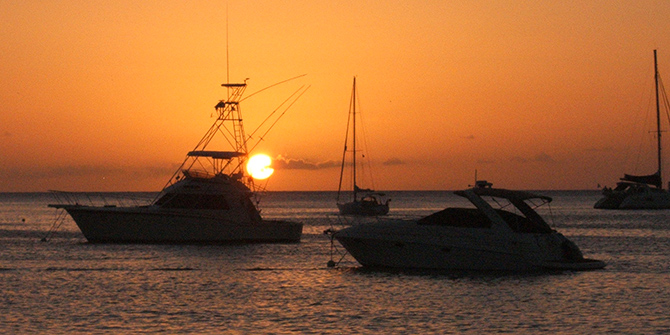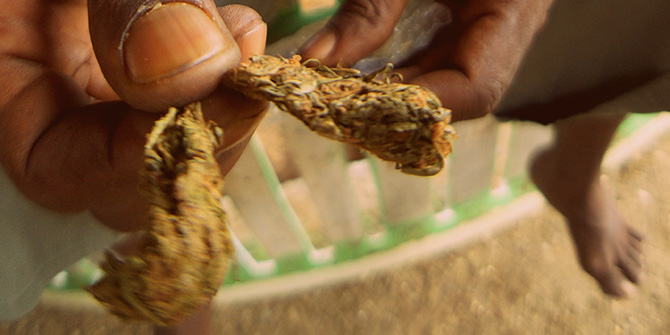The views and opinions expressed in this article are those of the author and do not necessarily reflect the official position of News784. Send all articles to [email protected]
By Philip Nanton
Historical shifts and contemporary changes in St Vincent and the Grenadines reveal how the frontier between the wild and the civilised is ever-present and continually shifting in the Caribbean and beyond.
Colonisers once recoiled from untameable peoples and landscapes, as did the establishment from “out of control” self-organising religious movements like the Shaker Baptists.
Yet today the modern frontiersmen of the illicit marijuana industry are gradually welcomed into the fold, while the exclusivity and exoticism of the unspoilt Grenadines lures in a wealthy global elite, writes Philip Nanton (University of Birmingham, UWI Cave Hill).
What can Caribbean countries offer the wider world beyond anti-colonial rhetoric, tax avoidance headaches for OECD countries, and gratitude for international handouts after the latest natural disaster? One thing, analytically speaking, is a unique insight into the world’s many “frontier societies”, caught between an imposed “civilising” order and an untamed “wild” that is forever encroaching.
 Between civilisation and wilderness
Between civilisation and wildernessBy “civilisation” I mean societal order and organisation that has an element of ideological imposition, as for example by government and artifice. The process of modernity, arising initially out of colonisation, is the beginning of what some may identify as “civilising” practices that prioritise development.
From the perspective of those who now hold power, who now mobilise the label of civilisation, or who are sufficiently dazzled by that power, the notion represents the best model of the present and the future. Ideologically, it is a model that any “reasonable” human being would embrace and applaud.
Wilderness is often forgotten or ignored when we discuss civilisation, but the two are closely linked. Wilderness is associated with raw nature and the absence of imposed order or a threat to its continuation. It is both a physical location and a state of mind. Wilderness represents the untameable in its many different forms, which together encroach on and challenge existing notions of order.
The relationship between wilderness and civilisation is ever-present and continually shifting. Social activities that might once have been seen as wild or out of control can be gradually brought under control, only for other forms of the wild to break out elsewhere.
The frontier becomes in fact a frontier process, where each of two mutually constitutive and incomplete sides is continually made and challenged by the other.
Global, Caribbean, and Vincentian frontier societies over time
In the United States the iconic talisman of the frontier was the cowboy, the male loner who knew how to look after himself on the great expanse of the range.
In the Caribbean, modern frontier traits are found instead in the restless and adventurous coastal wanderings of the Caribbean fisherman, sailor, or sea-port smuggler, the island-wandering woodcutter, the squatter on government land, the urban dame school teacher, or today in the innovative doctor and the mountainside ganja grower.
The frontier has also long been and very much remains a part of global production. Modern globalisation has shaped the development of various types of Caribbean island tourism, including a search for paradise wilderness. Thus, a wilderness that was once feared is now deemed worthy of protection.
In the specific case of St Vincent and the Grenadines, clear historical indicators of frontier features are conflict over territory, colonial acquisition, outpost status, and considerable distance from any metropolitan centre.
When the indigenous Garifuna put up a last-ditch defence against colonial takeover in the late 18th century, the port of Kingstown became a colonial out station where settler wagons could be circled (metaphorically) for protection. Natural features of the capital, Kingstown, were used to enhance its strategic and defensive role, with a fort and gun batteries facing both seaward and inland.
White colonial settlers were essentially sojourners interested in their plantations, money-making, and ultimately a comfortable retirement and death back in Britain. As to its outpost status, in the late 19th century the British government exiled the West African palm-oil trader King Jaja of Opobo to St Vincent precisely because they saw the island as an out-of-the-way-location.
The frontier also operated within Vincentian society. From the mid-19th century, a religious offshoot of the Methodist Church, known initially as the “Wilderness People”, became established in rural areas.
These Spiritual or “Shaker” Baptists, were officially banned from 1912 to 1965. Methodists and colonial legislators considered them out of control and despised their indulgence in trances and “speaking in tongues”, usually induced by long periods of abstinence and dancing. Meetings were held in the open air of the countryside, with women in prominent positions of power.
In summary, the sect was a self-created, rural, black, peasant-led organisation. It was perceived as a wild, rural threat because it was independent of European influence and associated with African cultural retentions located beyond the power of the local establishment.
 The modern allure of the wild in St Vincent
The modern allure of the wild in St VincentMore recently, however, “wild” social influences from St Vincent’s hinterland have become incorporated into the modern “civilised” centre, as represented by international capital and post-colonial national government.
Until the late 20th century, neglect and degradation were the historical experiences of St Vincent’s tiny ward islands the Grenadines. Neglect came in the form of a lack of basic amenities that resulted from the disinterest of administrations both colonial and post-colonial.
But the situation dramatically changed in the late 20th century thanks to the allure of the exotic wild for wealthy yachting tourists and foreign home owners.
The island of Bequia is now a well-established destination for international yachting enthusiasts. Mustique is a prime holiday location for the famous residents who maintain exclusive residences there. In 1995, two thirds of Canouan, another tiny dependent Grenadine island, was leased to a Swiss-Italian developer.
The frontier appeal of these tiny islands is their remoteness. Fed by a warm breeze, sunshine, and substantial expenditure their frontier remoteness is transformed into exclusivity and exoticism. Rather than simply being a boundary, the frontier in the Grenadines has changed and thrived to become a somewhat misleading relationship with a remnant of wild nature.
Marijuana cultivation and consumption on St Vincent’s mainland provides another example of the Caribbean’s modern reaccommodation of the wild. By 2002 there were an estimated 1,500 farmers cultivating in excess of 3,000 acres of marijuana in the northern hills of the island to supply markets both local and regional.
The farmers themselves are rugged individuals for whom insecurity is the hallmark of their work at every stage of the growing cycle. They are confronted with the prospect of thieves, crop eradication through military and police raids, ambushes by rival growers, and swindling by buyers in an unregulated market. In these ways they are frontiersmen in all but name.
In the past there were official attempts to eradicate and “civilise” these ganja growers. But today Anglophone Caribbean governments are considering decriminalisation of ganja cultivation and use. In the interim, suppliers and users alike exploit the space opened up between official illegality and widespread consumption by the state’s decision to turn a blind eye.
Today as in the past, in the Caribbean and beyond, the notion of the frontier offers a flexible means of revealing new insights into constantly evolving societies.
By Philip Nanton – University of Birmingham, UWI Cave Hill
Philip Nanton is a Caribbean poet and social analyst. He is an Honorary Research Associate of the University of Birmingham and an occasional lecturer at the Cave Hill campus of the University of the West Indies, Barbados.
His publications include Island Voices from St. Christopher and the Barracudas (Papillote Press, 2014) and Canouan Suite and Other Pieces(Papillote Press, 2016), and most recently Frontiers of the Caribbean (Manchester University Press, 2017).






